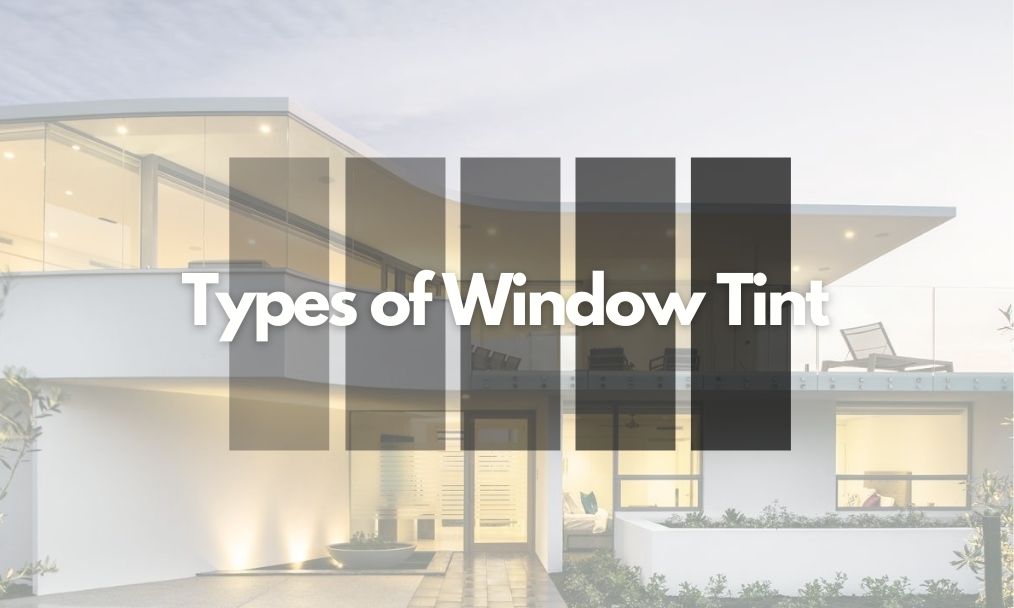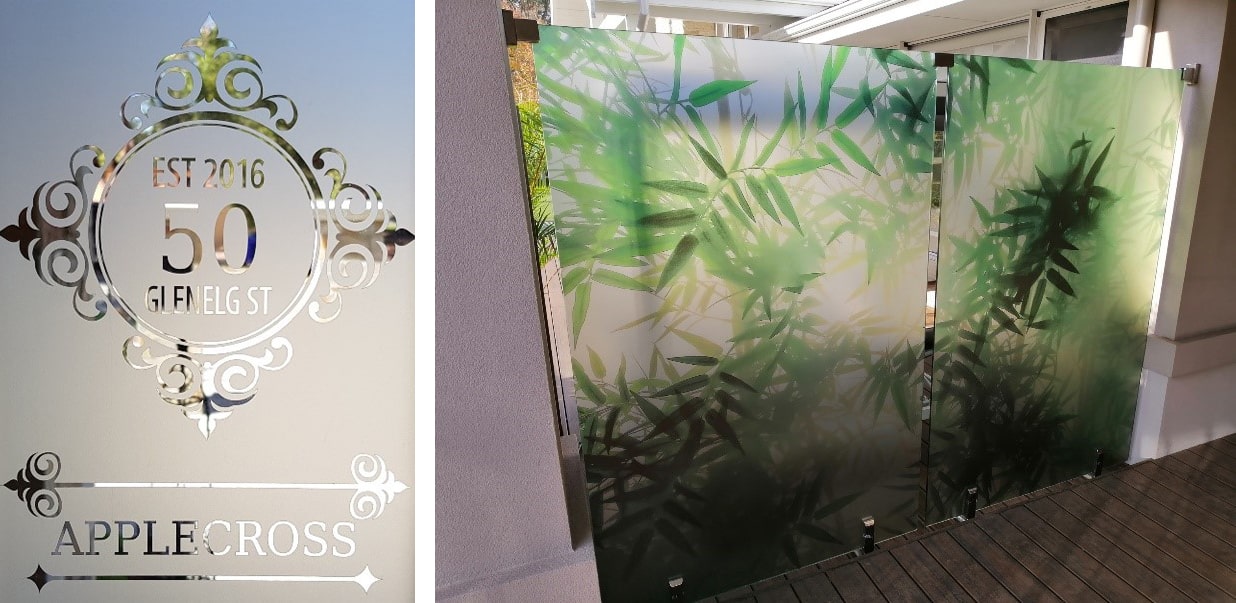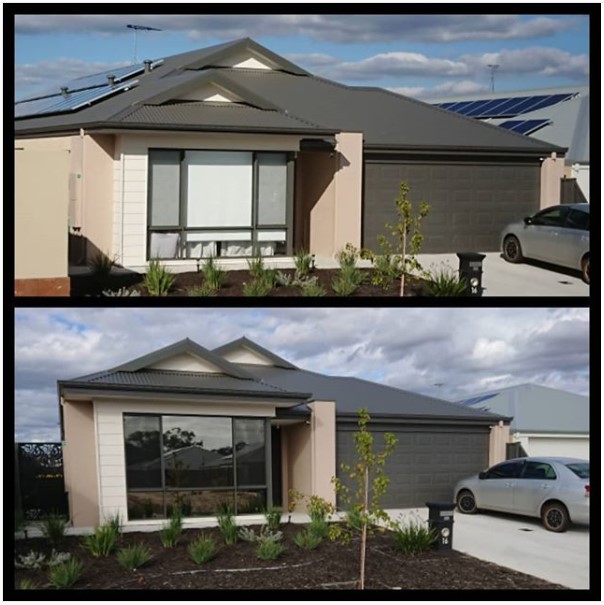
Did you know that there are many different forms of window tint available for residential homes? It can be overwhelming when faced with so many options! Hence, it helps to have a little understanding of what you want your window tint to do or achieve, as this will help narrow down the many choices available.
For example, natural light is great when it comes to illuminating your home interior. However, there may be situations when the light can get a little too bright, causing glare on computer screens, reflecting off kitchen benches or interrupting your TV viewing. Also, there may be sections of your home, perhaps street front windows that you want to keep shaded for privacy reasons.
Good thing there are certain types of window tint for homes designed to darken those see-through windows that may have been bothering you for some time.
However, choosing the best type of window tint can be challenging for the uninitiated. So, you need to know what type is best for your home.
To help you become acquainted with the types of window tint, we’ve broken down the essential information for you. This way, you can weigh the strengths of each one against the other to make a decision.
How to Choose the Best Window Tint Type for Your Home
Windows are windows, some people might say, and they seem simple enough if you’re thinking of getting them tinted. However, it’s choosing the right type of window tint for your home that’s a bit complicated as there are various factors to consider.
Do you live in a place where there’s abundant sunshine all year long? What are the general weather patterns in your region? Which side of your house gets the most sun exposure? What parts of your home may be more vulnerable than others to illegal entry (are there windows that are hidden from the street by bushes or other screening?)
It is very important to understand what type of glass you have in your home also. For example, only a certain form of window tint is suitable if you have low-e glass. If you have laminated glass, you cannot use very dark films. Window tinting on double glazing works more effectively if installed on the outside of the window. If you have toughened glass windows and want to have security film installed, then you would need additional structural attachment in addition to the film to ensure the film is effective due to the way toughened glass breaks.
Aside from answering the above questions, there are other factors that can influence your choice of window tint.
- Objective: There are different types of window tint designed to meet certain objectives. To choose the right one, know your primary goal for window tinting. Is it to reject heat, reduce glare, improve energy efficiency, enhance privacy, prevent illegal entry, improve aesthetics, or a combination of these reasons?
- Quality: How a particular window tint performs depends on the type and quality of the product you choose. Not all window films are created equal, and it’s worth checking the film performance specifications between different window tint manufacturers, and comparing the term and inclusions of any warranties. If having an in-home demonstration, ask the representative if they have any tools, they can use to show you the performance differences between different window tints.
- Building aesthetics: Aside from choosing the most functional window tint for your goals, you also need to select a type that matches the overall look and feel of your home. You don’t want windows that look out of place from the rest of your home – for example, a highly reflective, mirror type film looks great on a modern building, but can look very jarring on a country homestead style home. Sometimes, if you live in a strata managed apartment complex, there will be restrictions on making any changes to the appearance of the building, which is a major factor in film selection.
Different Types of Window Tint Explained
As previously mentioned, there’s more than one type of window tint suitable for homes, including the ones listed below.
Frosted, Decorative and Privacy Window Film
3M manufactures a range of decorative, frosted and privacy window films. There is also a specialised 3M decorative film range called 3M Fasara, although this is usually a special order item.
Considered a cost-effective alternative to glass etching and sandblasting, a decorative film can amp up the look of your home and offers the following benefits:
- Versatility. With a range of options to choose from — including frosted ones with a high level of “sparkle”, and those with more of a matte or sandblasted look, decorative window films are the only window film that can provide privacy for both day AND night, making them perfect for bathrooms, or windows where you might be overlooked by neighbours that are not suitable for blinds or curtains. Decorative window films can also be used to screen ugly views from your windows (such as fences). They are also suitable for interior and exterior window applications, which means you can even install 3M frosted films to your glass pool fence or balcony balustrade!
- Surface protection. Aside from enhancing the look of your home and ensuring privacy, decorative films protect your flooring, furniture and artwork from ultraviolet rays that can cause premature fading.
- Customisability. You can get decorative films customized with either digital print, computer cutting (to leave parts of your glass clear) or a combination of both! This means that if you have a favourite photo of a spectacular view (e.g., the Great Barrier Reef or Uluru), you can get it made into a decorative film for your home. Or if using frosted film for privacy in a glass front door or sidelight, you can have a custom cut pattern for you (or perhaps your furry friends!) to partially see through the glass still.

Price: Ranges from $85 per square metre for a basic film for interior application up to $145 and above per square metre, plus GST.
Security Window Tint Film
Security window tint film lives up to its name by keeping your home safe and secure from the elements, as well as reducing the risk of illegal entry or break-ins. It also provides the following additional benefits:
- Protection. Made up of one or several layers of laminated polyester film, security window films are also designed to prevent accidental glass breakage and illegal entry or home intrusion, whether through a glass window or door. Also, if a security window film protected surface is accidentally smashed or broken, the film can protect you or your loves ones against the shards of glass. All of 3M’s safety and security window film range reject a minimum of 99% of UV rays, meaning you can protect your home interior, including the furnishings, from rapid fading.
- Adherence to building codes. If your home has older or thinner glass, you can bring it up to code by installing security window film. This is often a requirement when starting a home based childcare service for older homes in Perth.
Price: Ranges from $90 per square metre to around $200 per square metre, plus GST.
Solar Window Film
For people who live in sun-soaked areas like Perth and the rest of Western Australia, solar window film is a great option.
Solar window film is much thinner than security or safety film and can be used on both residential and commercial properties. There are different solar window films suitable for installation on the interior or exterior of glass surfaces, as well as some specialized window films suitable for perspex or acrylic surfaces..
Solar window films come in a range of different Visible Light Transmissions (VLT for short), expressed as a percentage. A high VLT means a lighter film and increased transmission of light – perfect if you want to maintain maximum natural light in your home, while still stopping heat. A low VLT percentage means a darker film, more suited to homeowners who prioritise privacy, glare reduction and heat rejection over retention of natural light. 3M manufacture window films ranging from 5% VLT right up to 90% VLT.
Solar film is a popular window tint option because of the following reasons:
- Glare reduction. Glare is known to cause eyestrain by making it difficult to focus on reflective surfaces or objects (e.g., computer screens, pools, etc.). Solar window film is fabricated to reduce the amount of light, heat, glare and UV rays penetrating through glass windows.
- UV protection. Solar window tint can reject up to 99.9% of ultraviolet rays from the sun. This protects you and your family from health-damaging radiation, and helps prevent fading to flooring, furniture and artwork.
- Energy efficiency. These films can help you cut down your energy consumption and greenhouse gas emissions, because reducing the heat entering your home reduces your reliance on energy guzzling air conditioning systems. It also means you get to enjoy the benefit of more natural light while being protected by the sun’s harmful rays.
- Optimising natural light. Newer, modern solar window tint films provide optical clarity so natural that light can filter into your home whilst also allowing you to enjoy the view outside.
- Privacy during daytime. Darker or reflective solar window films make it hard for prying eyes to see the interior of your home, thereby ensuring your privacy. (It won’t give you nighttime privacy though, as it relies on a light imbalance to provide privacy. Once it is dark outside and lights are on inside your home, people can still see in).
Solar window films come in different tint shades, colours and and VLT percentages that you can choose from, depending on your needs and the overall look of your home. For example, you may opt for charcoal coloured film if you want to impart a contemporary look to your home.

Price: Ranges from $95 per square metre to $150 or higher per square metre plus GST.
Dual-Purpose Window Film
Dual-purpose films, as the name implies, serve more than one purpose, and the combined benefits of each subtype can help you in choosing the right window tint in the end. A good example of a dual-purpose window film is solar security films. These provide UV protection and all other benefits of solar window tints combined with the strength and durability of security films.
Price: Starts from $180 per square metre, plus GST.
What Type of Window Tint Is Best?
Ultimately, your choice of window tint all boils down to your personal preferences and priorities based on the factors mentioned earlier — that is, your objective, quality considerations and building aesthetics.
Of course, you also need to set a budget for your home window tinting project, including the cost of installation by a professional. Window tinting prices vary widely, not only based on the type but also on the size, brand and quality of the product, so don’t forget to factor in the installation cost into your decision-making.
If you need assistance in deciding on the best window tint film for your home, please reach out to us at Complete Film Solutions — your Perth window tinting specialists.
We’ll be glad to assess your project based on your goals, needs and preferences and come up with a reasonable quote.
